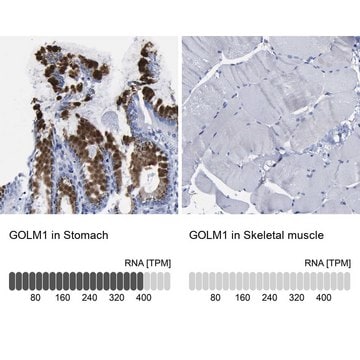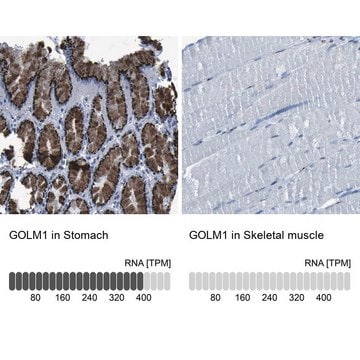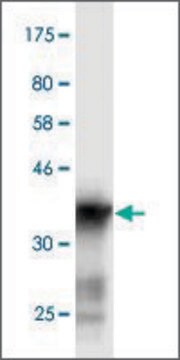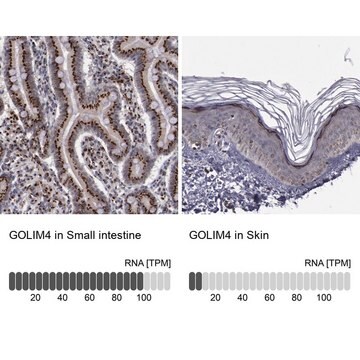MABC1117
Anti-GOLM1 Antibody, clone 6A2
clone 6A2, from mouse
Synonym(s):
Golgi membrane protein 1, Golgi membrane protein GP73, Golgi phosphoprotein 2
About This Item
Recommended Products
biological source
mouse
antibody form
purified antibody
antibody product type
primary antibodies
clone
6A2, monoclonal
species reactivity
human
packaging
antibody small pack of 25 μg
technique(s)
ELISA: suitable
immunohistochemistry: suitable (paraffin)
immunoprecipitation (IP): suitable
western blot: suitable
isotype
IgG1κ
NCBI accession no.
UniProt accession no.
target post-translational modification
unmodified
Gene Information
human ... GOLM1(51280)
General description
Specificity
Immunogen
Application
Enzyme Immunoassay Analysis: A representative lot detected GOLM1 in ELISA applications (Zhang, A., et. al. (2012). J Biomed Res. 26(6):467-73).
Immunohistochemistry (Paraffin) Analysis: A representative lot detected GOLM1 in Immunohistochemistry applications (Zhang, A., et. al. (2012). J Biomed Res. 26(6):467-73).
Immunoprecipitation Analysis: A representative lot immunoprecipitated GOLM1 in Immunoprecipitation applications (Zhang, A., et. al. (2012). J Biomed Res. 26(6):467-73).
Western Blotting Analysis: A representative lot detected GOLM1 in Western Blotting applications (Zhang, A., et. al. (2012). J Biomed Res. 26(6):467-73).
Apoptosis & Cancer
Quality
Immunohistochemistry (Paraffin) Analysis: A 1:250 dilution of this antibody detected GOLM1 in human prostate cancer tissue sections.
Target description
Physical form
Storage and Stability
Other Notes
Disclaimer
Not finding the right product?
Try our Product Selector Tool.
Certificates of Analysis (COA)
Search for Certificates of Analysis (COA) by entering the products Lot/Batch Number. Lot and Batch Numbers can be found on a product’s label following the words ‘Lot’ or ‘Batch’.
Already Own This Product?
Find documentation for the products that you have recently purchased in the Document Library.
Our team of scientists has experience in all areas of research including Life Science, Material Science, Chemical Synthesis, Chromatography, Analytical and many others.
Contact Technical Service








